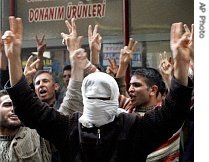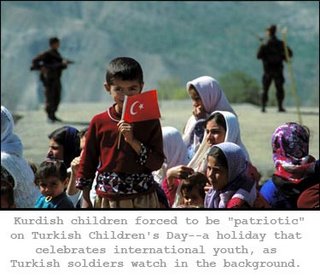In Turkey, “Kurdish” is synonymous for “terrorist”, even if the subject matter is a child. Turkey’s constitution is based on racist ideology where the regime’s main pillar of fear is the existence of Kurds.
Turkish security forces shot Fatih Tekin, a three year old Kurdish boy, during a police raid on civilians’ houses in Batman Northern Kurdistan, on 30 March 2006. Fatih was not the only “terrorist” to be shot. The list is long but apart from Fatih, Enez Atak (6), Abdullah Duran (9), Muhlis Ete (16), Mehmet Isik (17), Mehmet Akbulut (18) and Emrah Fidan (19) were all killed. These names attract my attention because of their tender ages. There was also a much older Kurdish “terrorist”, Halit Sogut, 78 year of age.
Kurds, according to Turkish official policy, are all terrorists from 3 to 78 year of age.
The murders of children came from the direct order of their superior, the Turkish Prime Minister. "The security forces will intervene against the pawns of terrorism, no matter if they are children or women. Everybody should realise that,” the Turkish Prime Minister said to his troops, effectively permitting them to kill Kurdish women and children.
This was not the first time that the Turkish security forces have killed children. Ugur Kaymaz, 12, and his father Ahmet Kaymaz were shot by security forces in front of their Kiziltepe home on 21 November 2004. The two were killed in a police operation allegedly against members of a “terrorist” organisation. The governor of the town, in his first statement, said that Ugur and Ahmet Kaymaz were killed in a clash. A 12-year-old boy killed fighting alongside a terrorist organisation. There was an international outcry to label a child as a terrorist: it can only happen to Kurds in Turkey. Feeling the international heat, the Prime Minister stated, “Describing a boy aged 12 as a terrorist is unfortunate. This can’t happen.” Yes it did happen, and in your country.
In the autopsy report, there were a total of 13 bullets in the 12-year-old Ugur Kaymaz's body. Four of them were in his right and left hands, and nine on his back. It was determined that nine of the 13 bullets were fired from a very short distance (less than 50 centimeters). Ugur had gunpowder marks on his body. His father Ahmet Kaymaz had eight bullets in his body. It may not be easy to imagine the hatred inside the security forces that kill a 12-year-old boy with 13 bullets from the distance of a 12 inch ruler.
The persecution of Kurds by Turkish state and Turkish non-state agents has historical roots and hinges on the official ideology, which is not so far away from Nazi Germany. Turkey is a state that is built on lies and racist teaching of Atatuk which enshrines the persecution of Kurds. An example can give the depth and scale of the racist teaching of the society.
On 08 March 2006, during the Kurdish uprising in Northern Kurdistan, two members of the security forces wearing t-shirts declaring "Turkey", took a hostage at a popular Burger King restaurant in Istanbul, with guns and knives. While chanting Turkish nationalist and anti-Kurdish slogans, the soldiers protested because they were serving in Turkish cities and not having an opportunity to go to Kurdistan for hunting Kurds, presumably children. There is a Kurdish proverb: “a handful represents the quality of the rest of the harvest”. This incident put us against a vital question which involves innocent lives: can a security force that is brought with such a racist spirit protect Kurds in Turkey? I am sure there were not the same men who murdered 12-year-old Ugur Kaymaz with 13 bullets, but they no doubt graduated from the same Turkish school of ideology.
The EU should take more responsibility for Turkish crimes against humanity. Few European MPs made much noise. During the ongoing uprising in Turkey, over two dozens of Kurds, including some children, were murdered. If these were doges, the European member states would have taken a better stand.
Furthermore, the European member states are part of the Turkish crimes, as they play music to Turkish ears, which encourages further persecution of Kurds. The Euro MPs still not publicly recognise that the land of Kurds is Kurdistan which is occupied by Turkey. And that is a racist stand. A racist incident as identified by the UK Stephen Lawrence inquiry and by the ensuing Macpherson Inquiry is “racist incident is any incident which is perceived to be racist by the victim or any other person.” As a Kurd, I found Turkey a racist state and responsible for the genocide of my culture and language.
It is nonsense to urge the Turkish state to change its attitude toward Kurds. It is impossible. An outside help is needed for peaceful change in Turkey. Otherwise, Kurdish uprising would change it. We have already seen the start of this. For Turkey to survive and to join the civilised nations, Europe must help.
For the EU to see a peaceful Europe must pursue its values for every nation, ethnic group and communities in the Europe including Kurds. Then the EU member states need to propose a reform package to Turkey which includes the following:
1 – For Turkey to withdraw its security forces form Kurdish homeland, Northern Kurdistan, end the security oppression under the EU mandate;
2 – For EU to facilitate and monitor Northern Kurdistan general election, under international monitors, to establish Kurdistan Parliament and government – similar to the case of devolution of power in other EU member states such as Scotland and Wales.
3 – EU to initiate, facilitate and monitor the devolution of power in Kurdistan and assist in reviving Kurdish economy, language and culture;
4 – EU to facilitate to brining Kurdistan’s Parliament bloc in the EU parliament to establish Kurdistani Bloc
5 – EU to facilitate the Northern Kurdistan Parliament would become the only legislative power of region;
6 – EU to facilitate the Kurdish language becomes the official language in Kurdistan in every aspects of life.
Without these fundamental measures, there will not be peace either in Turkey or in the EU countries.
Scource: Kurdish Media

Above Kurdish demonstrators
Rights Groups: Abuses on the Rise in Turkey's Kurdish Regions
Yalcindag cites violent demonstrations that erupted in the region's largest city, Diyarbakir, and neighboring Batman last month during the funerals of four PKK fighters. Though the government has never issued a statement on how many people died in the violence, human rights monitors say at least 13 civilians, four of them children, died in clashes with police.
"You have to respect the right to life of the demonstrators, I mean," she added. "The result must not be 10 people killed in Diyarbakir, or one child killed in Batman. Two persons were killed in Kiziltepe [Mardin province]. Hundreds of people were wounded or transferred to prisons and tortured. We do have medical reports."
The London-based rights group, Amnesty International, has joined calls for the Turkish government to investigate allegations of abuse during the protest rallies. In a statement, the organization said, "in light of the reported decline in the use of torture in recent years" Amnesty International was "particularly disturbed at allegations of torture, or ill treatment of detainees, including beatings, death threats and being stripped naked and sprayed with cold water."
Abdullah Gul is Turkey's foreign minister and a leading proponent of Turkey's membership in the EU. In a recent interview, Gul told VOA that there was no question of his government slowing the pace of reforms. Gul says the PKK is seeking to provoke his government into conflict, in order to derail the reform process, because, he says, the reforms have weakened the PKK's appeal among the Kurds.
"We believe democracy will isolate the terrorists," he said. "So, that is the best way to fight terrorists. Of course, we will take more efficient and effective measures to fight terrorism, but, we will keep this line very consciously."
Proposed measures to deal more effectively with the PKK, which is on the U.S. State Department's list of terrorist organizations, include stiffening Turkey's controversial anti-terror law.
Under the proposed amendments, carrying pro-PKK banners would be deemed a crime punishable by up to 15 years in prison. Spreading PKK propaganda would carry a maximum penalty of five years.
Huseyin Kalkan is the mayor of Batman, and belongs to Turkey's largest pro-Kurdish party, the Democratic Society Party, which controls the majority of municipalities in the Kurdish region.
Kalkan says there is growing concern that Turkey is slipping back into what he calls "the scary days."
Kalkan says he and scores of his fellow party members are already facing a slew of court cases under existing laws. Prosecutors are seeking a 10-year sentence for Kalkan on charges of aiding a terrorist organization. He says his alleged offense was calling on PKK demonstrators in Batman to disperse peacefully after exercising their democratic right to protest.
Kalkan cautions that such legal crackdowns may help the PKK find new recruits.
Kalkan concludes that, in the absence of a full democracy, some young Kurds may once again turn to the mountains, where the rebels are based, in the hope of finding a solution to their problems.


1 comment:
I am SHOCKED by this articly. I am an Albanian person. Went to university in Turkey. Had Kurdish friends. They had no problem with being Kurdish. This article is FULL of garbage. Nothing is true at all. I am also surprised that You publish this article without questioning the source. Anyhow, I hereby testify that it is FULL garbage. Kurdish "terrorists", not citisens, just destroy other Kurdish citisens houses.
Post a Comment